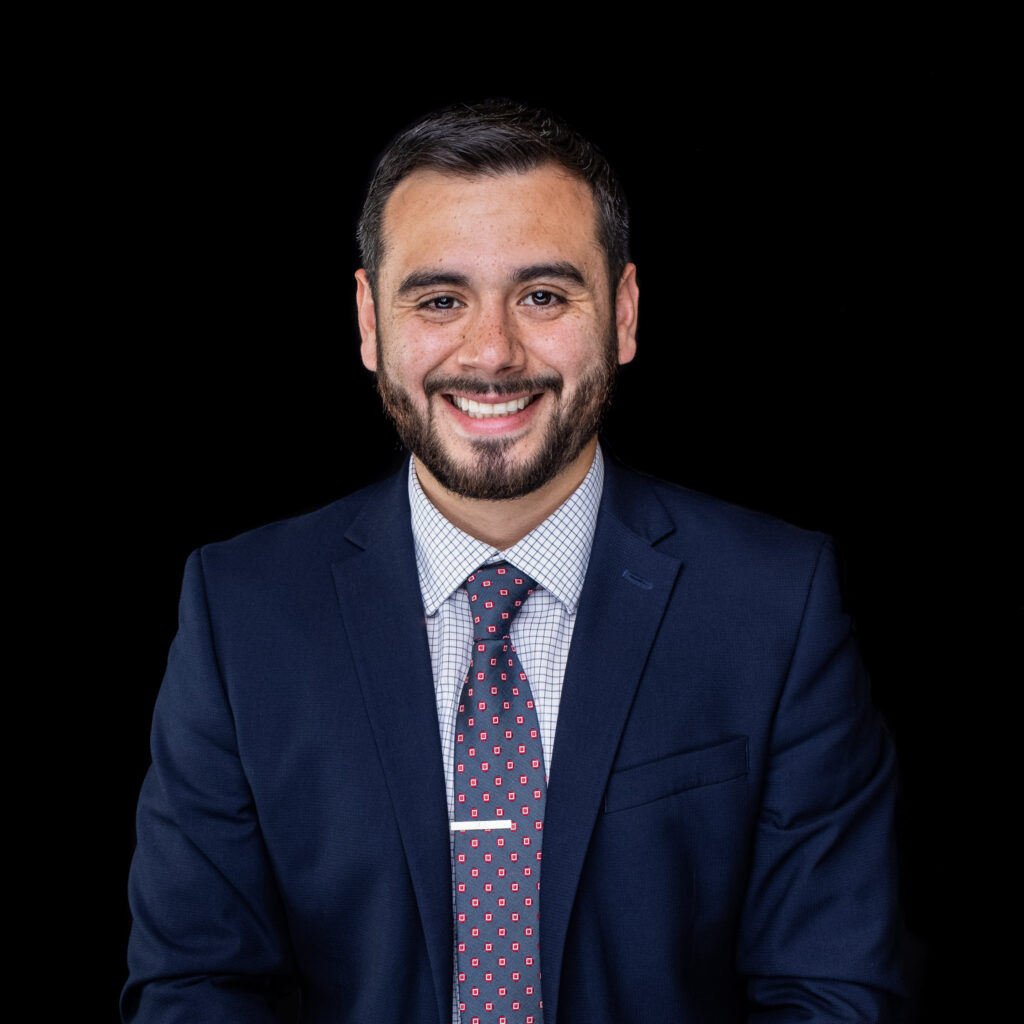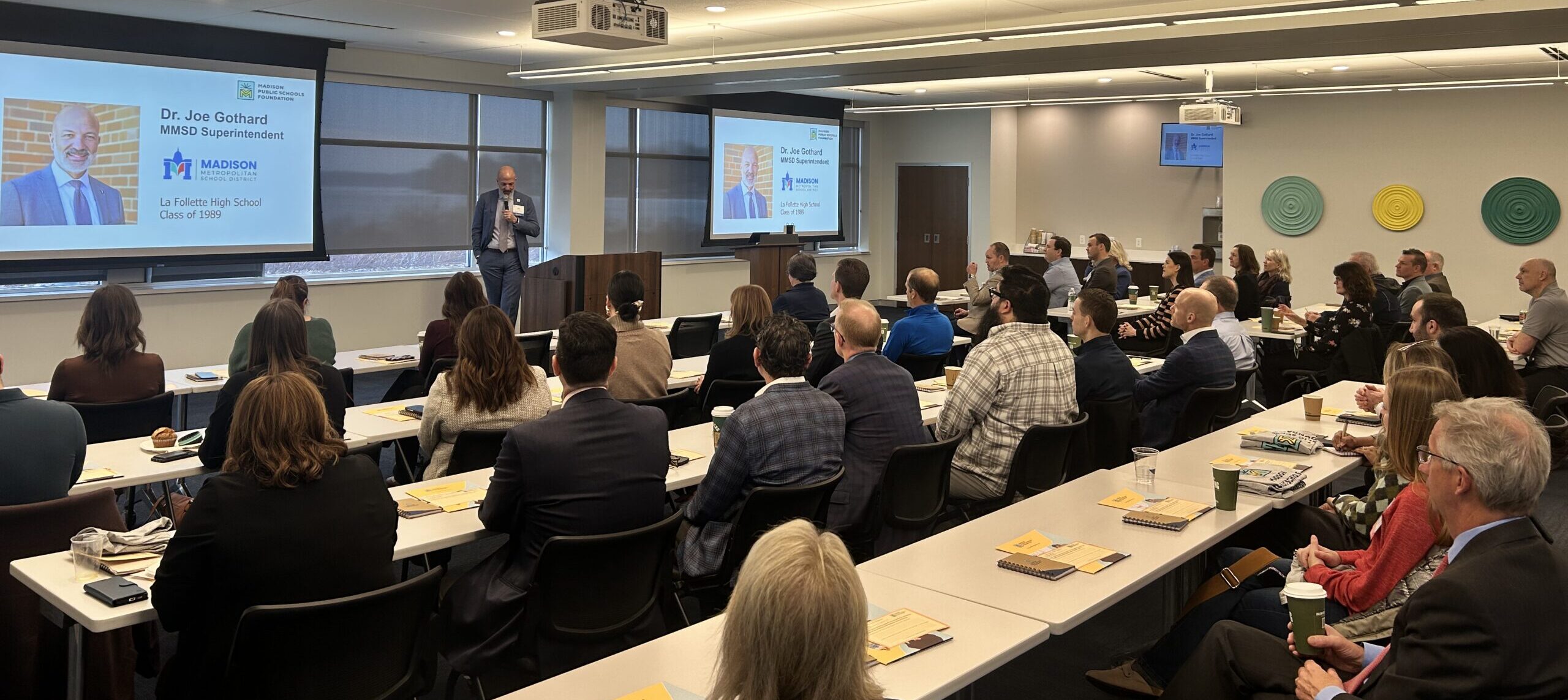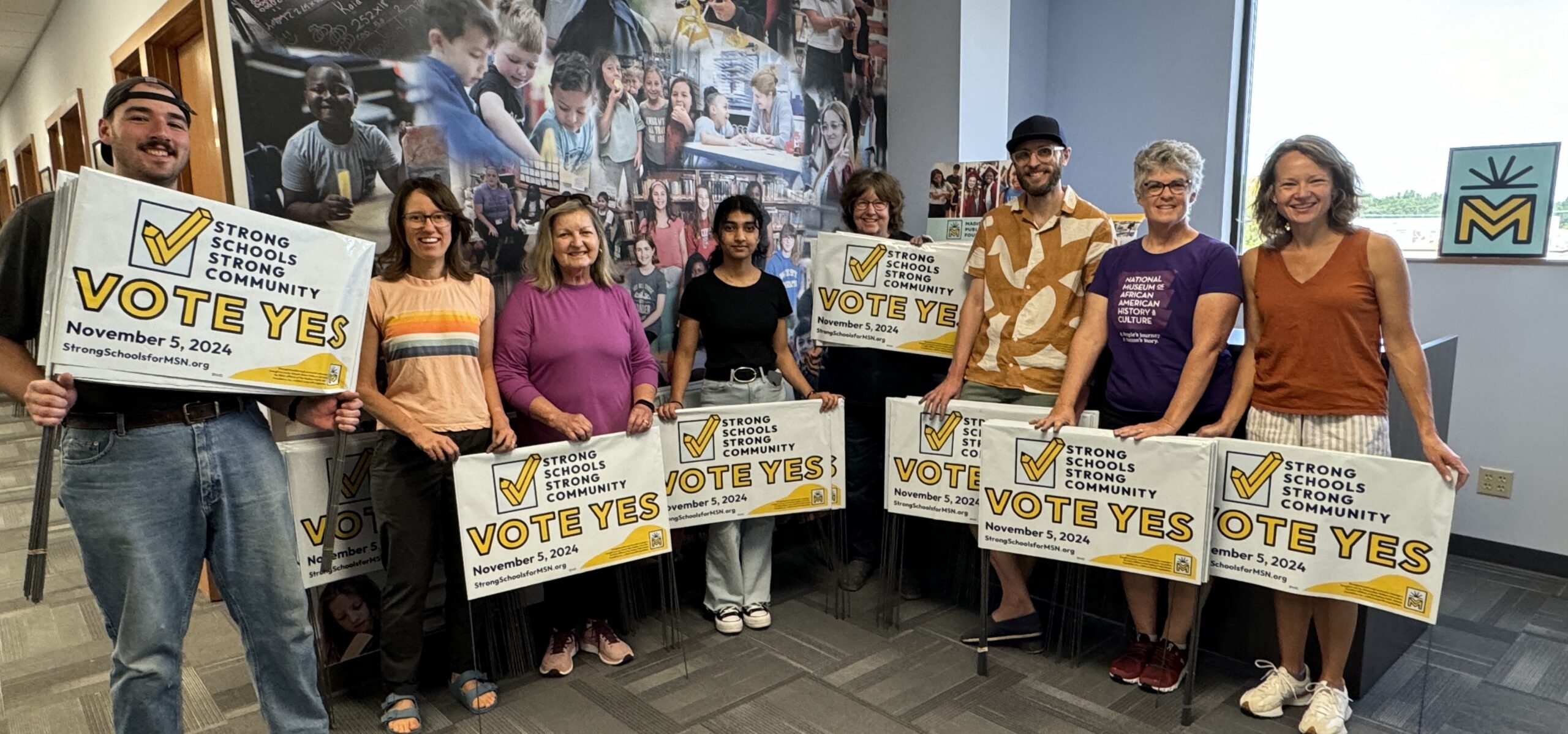
Written by Lisa Gaumnitz
David Aguayo learned to value education from his mother, a daughter of migrant workers, who earned her teaching degree while raising a family.
He learned hard work and dependability from his father, an Ecuadorian immigrant.
And from Susie Hobart, his fourth and fifth-grade teacher at Lake View Elementary on Madison’s North Side, he learned he could do great things.
“She put me in positions where I was able to express and show my leadership skills,” says Aguayo, a 2011 East High School graduate who is now the head of advocacy and public policy for the Greater Madison Chamber of Commerce. “She was in constant communication with my parents, constant communication with me. And it was her really believing I could do great things that really allowed me to excel and to continue to hold that truth in my heart.”
At 29, Aguayo has already done many great things – from leading neighborhood cleanups and food drives in elementary school to mobilizing Latino voters in historic numbers in the 2020 presidential election to, most recently, working as part of the Madison-based Latino Consortium for Action to raise $1 million for COVID relief for Latino families.
Yet talking to him on a warm October day outside a coffeehouse – one that was capitalizing on the Streatery program he advocated for on behalf of the Chamber to provide expanded outdoor seating during COVID – it’s easy to believe the best is yet to come.
This is not just because of Aguayo’s resume, replete with social service, public service and political jobs and honors, including being named one of Madison 365’s “39 most influential Latinos in Wisconsin.” Nor is it solely based on his passion and commitment to “giving a voice to the historically excluded and being an advocate for the Latino community” – a mission spelled out on his LinkedIn profile.
But believing in Aguayo’s clear view of a better future is easy when seeing the connections he’s made to help build it. And they are evident on this morning as he stands up during the interview to greet and hug Camille Carter, president of the Madison Black Chamber of Commerce, as she happens to walk past.
It’s those relationships that make it clear how Aguayo will tackle the challenges ahead.
“Madison is on the cusp of opportunity. We’re almost there,” he says. “We are a great city. I love this city. Born and raised, educated here, moved back here, going to raise my family here. There is an opportunity here. I’m excited for our generation to step up and take that lead.”
A passion for policy and politics
Aguayo’s Madison story begins with his Texas-born mother and his Ecuadoran father, who immigrated to the United States in search of a better life at 18. His mother completed the college courses she needed for her teaching certificate one by one while raising three boys, then began teaching in the language immersion program at Sandburg Elementary School.
“She really instilled in us the importance of education,” Aguayo says. “So all through elementary, high school, and UW Madison, I always had the goal of advancing in my education, getting good grades so I could do things in life.”
His dad never had the opportunity to go to college because he was working every day to provide for his family. “What I’ve learned from my dad is work ethic. It’s really important to be responsible, to be dependable, and to get stuff done,” Aguayo says.
Another early important influence was an animated historical drama on PBS named “Liberty’s Kids,” which first aired in the early 2000s. The show aimed to teach kids about the founding of America by telling about a group of fictional young people during the American Revolution.
“That really, for some reason or another, enticed me to want to be in that position, of making laws and policies that affect people,” he says.
Aguayo also fed his interest in Hobart’s multi-cultural, multilingual classroom at Lake View Elementary.
“In our fourth and fifth-grade class, we focused on creating a community and engaging in social action beyond the brick walls,” recalls Hobart, who is now retired. “David often sought and relished active leadership roles.”
She cites Aguayo’s efforts as a student senator and leader in neighborhood cleanups, school food drives, tree planting, and fundraising for a “child of Chernobyl” project related to the 1986 nuclear disaster. He was a reading buddy to a native Hmong first grader, Hobart adds, and “encouraged him to have fun while reading.”
Aguayo’s “positive attitude, empathy, and willingness helped him engage in cross-cultural relationships,” Hobart says. “This extended to the playground where he moved easily with students from different backgrounds.”
At East High School, much of his focus was on football and track, and he remains in touch with his coaches Chad Gunnelson and Roman Ryan. He also started volunteering on political campaigns and continued nurturing that interest at the University of Wisconsin–Madison, where he majored in pre-law with a focus on government administration.
Aguayo planned to be a lawyer, with his first job out of college in the legal field. He worked for the Wisconsin Department of Justice helping crime victims who spoke Spanish.
“Part of my job was facilitating and making sure these victims received their compensations but also building that rapport,” Aguayo says. “There’s a real distrust in government and in authority. Especially within the undocumented community, so there’s fear there.”
His next move, to Washington, D.C., strengthened his desire to do something benefitting the Latino community through legislation and policy. He worked as a paralegal for the Federal Trade Commission, then networked his way into interning for U.S. Representative Mark Pocan and was appointed to the Latino Community Development Commission by D.C. Mayor Muriel Bowser.
“I was really able to hone in on the Latino community there and kind of develop mechanisms to help facilitate policymaking that would directly affect them,” Aguayo says.
Returning to Madison, and working for Madison
Eventually, Aguayo and his wife, Kristin, an East High graduate who was his high school sweetheart, decided to return to their hometown for a lower cost of living and to start a family (daughter Madison was born in December 2020). He worked at the Wisconsin Department of Workforce Development, ran Kaleem Caire’s campaign for Madison School Board, held a series of positions within the Democratic Party of Wisconsin, and became the Wisconsin Latino Coalition Director for the Biden presidential campaign.
“The Latino population here in Wisconsin voted in higher numbers than any election year ever, and we carried the vote for Joe Biden here in Wisconsin,” Aguayo says.
He started a consulting business to help first-time candidates of color run for office, drawing on lessons learned from his jobs, from knocking on doors for other candidates, to organizing constituents statewide and from his own personal experience as a person of color in the political world.
His work at Aguayo LLC and with the presidential election got him noticed by the Greater Madison Chamber of Commerce. President Zach Brandon reached out to him to become their next public policy manager.
“David’s name kept appearing in a lot of conversations we were seeing online,” says Kevin Little, the Chamber’s Vice President who hired Aguayo. It was clear Aguayo was somebody who cared passionately and was working to create a more diverse pool of elected officials.
“He was building a family here and he also had the experience of starting his own business. That was a great nexus of skill sets,” Little says.
For Aguayo, working for the Chamber allows him to use those skills and feeds his policy interests. Aguayo is the only person in the organization with a full-time advocacy position; he is registered to lobby at the local, state, and federal levels.
The Chamber’s board of directors decides what issues are included on the group’s agenda, with Aguayo helping guide the board’s decisions and leading the lobbying efforts in support of those issues. Top-listed on its current advocacy agenda is to “make greater Madison the best place in the country for entrepreneurs of color to own a business.”
Strategies include increasing access to capital for people of color and removing state and local licensing barriers tied to federal immigration status, allowing undocumented immigrants to apply for driver’s licenses, among other things.
Another priority for the Chamber involves the recently passed federal CHIPS and Science Act aimed at revitalizing the U.S. position in semiconductor research, development, manufacturing, and regional technology hubs. Madison stands to benefit greatly, with all the components necessary to support a regional technology hub, according to the nonprofit Brookings Institution, which identified Madison as the top-ranked prospect in its study “The Case for Growth Centers.”
“I’m really proud of that agenda,” Aguayo says of the Chamber’s priorities. “I think it’s one of the most progressive business advocacy agendas, and I had a hand in developing that and ensuring that our priorities show, ‘This is the Madison we aspire to be.’”
“My mantra is, ‘How can I help you?’”
Aguayo is eager to make government work better at all levels. “We’ve been in this system and it’s worked for the majority of folks, but not for everybody. There are policies out there that do have an additional effect on people of color.”
As an example, he points to legislation introduced by Rep. Sheila Stubbs to remove licensing barriers for hairstylists and barbers of color. Current standards were developed for white hair, not for black hair and customer needs, and the process can discourage people of color from starting their own businesses.
Issues can begin to be tackled by “just opening up these conversations, going to the community and learning from them,” Aguayo says. “And that’s kind of been my mantra, how can I help you? And I take that mantra with me.”
He meets regularly with presidents of the Madison Black Chamber of Commerce, the Hmong Wisconsin Chamber of Commerce, and the Wisconsin Latino Chamber of Commerce has monthly meetings with other Latino leaders, and has been involved in important conversations in Madison. He served on the ad hoc committee to rename James Madison Memorial High School – now called Vel Phillips Memorial High School, after the first black person elected to statewide office – and recently was appointed to the Dane County Regional Housing Strategy Advisory Committee.
“I see somebody who wants to make an impact,” Little says. “He is passionate and wants to give back. There are a lot of people he is already mentoring, even though he is still growing his own career.”
Hobart, for her part, isn’t surprised. “He was always a leader,” she says. “And I have followed his post-high school life. He continues to be a leader.”

